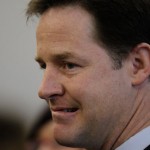How Will Clegg End Britain's Election Deadlock?
 Lib Dem leader Nick Clegg now gets to choose the next prime minister of Great Britain. While Labour may grant Clegg's biggest wish, electoral reform, teaming with Gordon Brown would mean tying his fortunes to one of the most untrustworthy men in parliamentary history.
Lib Dem leader Nick Clegg now gets to choose the next prime minister of Great Britain. While Labour may grant Clegg's biggest wish, electoral reform, teaming with Gordon Brown would mean tying his fortunes to one of the most untrustworthy men in parliamentary history.
So Lib Dem leader Nick Clegg gets now to choose the next prime minister of Great Britain. And what a devil of a choice it is too!
For Labour:
Labour is more likely to grant Clegg his party's most desired wish: a change in the electoral system to enhance minority party chances. Aligning with Labour confirms the Lib Dems as a party of the left, which is where most present (and all potential) future Lib Dem voters are found. A desperate Gordon Brown will gladly name Clegg to any job he wishes: Chancellor of the Exchequer, Foreign Secretary, just name it! Given Gordon Brown's disconnect with English (as opposed to British) voters, Clegg could even imagine that a Lib-Lab coalition might again establish his party as the dominant party of anti-Conservatism south of Scotland and east of Wales.
On the other hand:
Joining Labour means joining a government that will have to carry out the most draconian cuts in public spending since at least 1979. A re-elected Brown government will find itself even more unpopular in 2011 than it is today. And while there is nothing in the rules of British politics that prohibits a third party from favoring the second party over the first, those rules may have just subtly changed. If British voters voted "for" anything last night, it was to bid good-bye to Gordon Brown - and they may react very negatively to fresh-faced Nick Clegg thwarting that vote for his own personal advantage.
Speaking of personal advantage: a choice for Labour by the Lib Dems is a choice to tie Clegg's personal and party fortunes to those of one of the most untrustworthy men in parliamentary history. Brown showed himself a conniving and spiteful second below Tony Blair; what are the odds that he will be less vicious as a senior colleague?
Yes, joining Labour confirms the Lib Dems as a party of the Left. That same choice however will discredit them as a party of the middle class, since Labour's budget-balancing plans contemplate big attacks on middle-class living standards.
Finally - and here I think will be the decisive consideration - because Labour is the weaker party now, a choice for Labour will have to be explicit. When Gordon Brown meets with the Queen in the next hours, she will ask him: Can you command a majority in Parliament? He will have to assure her that he can - meaning he'll need some kind of commitment from Clegg. As the party that gets the second chance to form a government after Labour has failed, and as the largest party in Parliament, the Conservatives need less from Clegg: a tacit understanding that he will not vote against them in the near future.
If Clegg supports Labour, he is supporting the government. If he supports the Conservatives, he can remain in opposition, albeit an opposition that is holding quiet for the time being.
A tough call for a not tough man!